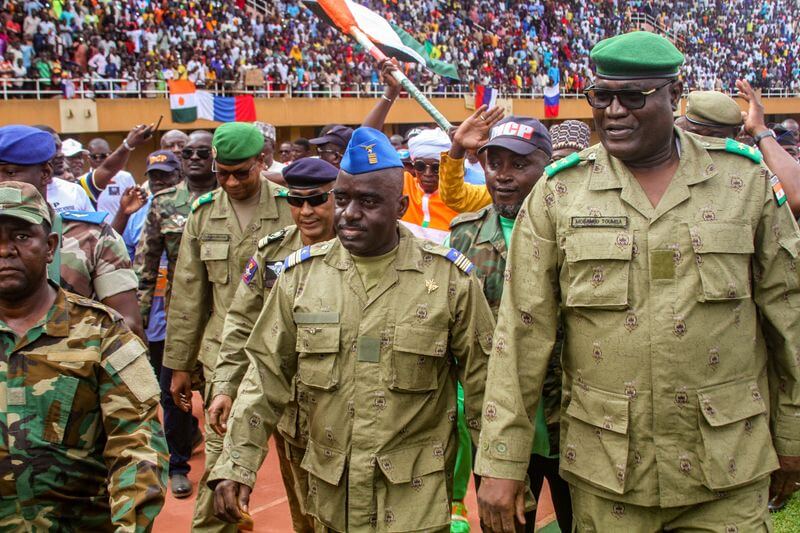Niger was hit with sanctions again on Tuesday, just hours after its new military leaders rebuffed the latest diplomatic mission intended for restoring constitutional order in the aftermath of a coup.
According to a presidential spokesperson, Nigerian President Bola Tinubu imposed fresh sanctions through Nigeria’s central bank to oppress individuals involved in the coup.
Niger Junta Denies Diplomatic Negotiations
The African Union (AU) had planned to send a joint mission to Niger, with members from the UN and the Economic Community of West African States (ECOWAS) on Tuesday. However, the Nigerien military government, which has closed the country’s airspace since coming to power, refused permission, as reported by French magazine Jeune Afrique.
The coup leaders stated in a letter on Tuesday that a “climate of threatened aggression” made it difficult to begin negotiations on resolving Niger’s constitutional crisis.
ECOWAS announced late on Tuesday that the joint mission was aborted, saying it will “continue to deploy all measures to restore constitutional order in Niger.”
The West African bloc had previously given a seven-day deadline for reinstating Nigerien President Mahmoud Bazoum, who was ousted in a military coup on 26 July, but the junta has ignored the warning.
Niger Junta refused to welcome a joint U.S, ECOWAS, AU & UN delegation today. They will only meet them when all the sanctions imposed on Niger are lifted. Niger now hold the bargaining chip, & they are calling the shots. Any Military intervention will backfire. pic.twitter.com/iQNSWEwUNZ
— NEFERTITI (@firstladyship) August 8, 2023
Acting US Deputy Secretary of State Victoria Nuland met with coup leaders on Monday and claimed they refused to let her speak with Bazoum, whom she described as under “virtual house arrest.” She further said the mutinous officers were unresponsive to her pleas to begin negotiations and restore constitutional government.
Nuland told reporters, “These conversations were extremely frank and at times quite difficult because, again, we are pushing for a negotiated solution. It was not easy to get traction there. They are quite firm in their view of how they want to proceed.”
In an interview, US Secretary of State Antony Blinken said diplomacy is the preferable course of action, and that he could not speculate on the fate of the 1,100 US military troops stationed in Niger.
Tinubu and other West African leaders “would prefer a resolution obtained through diplomatic, peaceful means rather than any other,” the Nigerian president’s spokesperson Ajuri Ngelale told the media. However, “military intervention has not, and will not, be taken off of the table,” he remarked.
Sanctions on Niger Junta
In response to the junta’s rebuff, ECOWAS and the West African Monetary and Economic Union (UEMOA) have imposed severe sanctions on the country. The bloc restricted all commercial transactions with Niger, froze its state assets in the regional central bank, froze state and state firm assets in commercial banks, and blocked all financial assistance with regional development banks.
Following the sanctions, the regional central bank suspended Niger’s planned $51 million bond in the West African regional debt market.
The EU, one of Niger’s largest contributors, has halted financial aid and security cooperation. France, another important Nigerien partner, has suspended development funding and financial support.
Following the coup, the US halted aid programmes valued more than $100 million to Niger, putting pressure on the junta to reinstate the civilian government. The US has already warned that the coup may result in a suspension of all cooperation.
The World Bank has halted payments until further notice, except for private-sector partnerships, which will continue with caution. Niger has one of the World Bank’s largest portfolios in Africa, reaching $4.5 billion, and it has also received $600 million in direct budget support from the lender between 2022 and 2023.
Niger’s direct development aid from Canada has been halted. Following the coup, the Netherlands temporarily ceased close cooperation with the government. The Dutch government had been assisting Niger with development and security programmes.
West African nations imposed sanctions and threatened force if Niger's coup leaders fail to reinstate ousted President Mohammed Bazoum within a week, while supporters of the junta attacked the French embassy in Niamey https://t.co/FO36qOdVJA pic.twitter.com/q3OKki6Bi9
— Reuters (@Reuters) July 30, 2023
Niger Coup
The coup in Niger was the result of months of conflict between President Mohamed Bazoum and his chief guard over the leader’s efforts to emerge from the shadow of his predecessor.
Since attaining power, Bazoum had increased military cooperation with France and the US, limited the authority of Nigerien army commanders, and launched anti-corruption initiatives.
Members of the Nigerian presidential guard seized Bazoum towards the end of July. Gen. Abdourahamane Tchiani, the head of Niger’s presidential guard, declared himself head of a transitional government he called “the National Council for the Safeguard of the Homeland.”
UN Humanitarian Efforts Hindered by Military Coup
Border and airspace bans have hampered UN humanitarian help by restricting shipments of medicine and food. The UN humanitarian leader in Niger, Louise Aubin, said that aid agencies have been pressing to replenish depleting stocks as regional sanctions threaten to increase the number of needy people.
Aubin warned, “Some people will soon be feeling the pinch of this [...] More than the 4.3 million people we had planned on supporting through emergency humanitarian assistance, we might see that number growing and growing fast.”
According to the UN source, flights operated by the UN Humanitarian Air Service (UNHAS) within Niger were affected but not suspended due to the junta’s decision to close its airspace.

